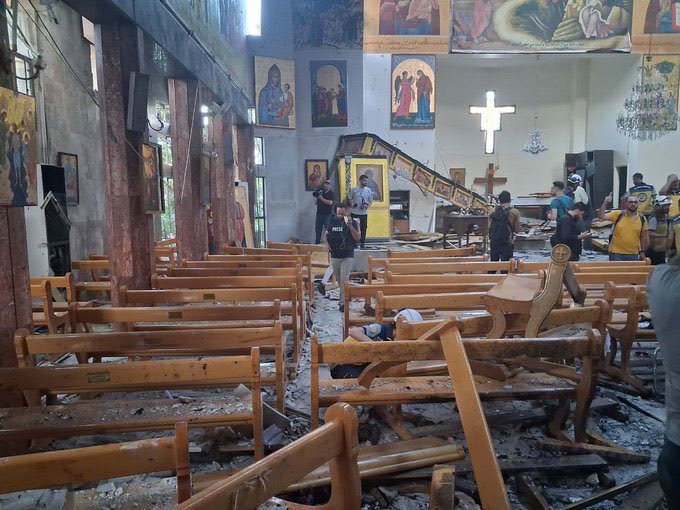ISIS Strikes Again: Suicide Bomber Kills 15 in Damascus Church
ISIS Suicide Bombing at Prophet Elias Church in Damascus
In a tragic event that has shocked the world, a suicide bomber affiliated with ISIS detonated explosives at the Prophet Elias Church in Damascus, Syria, resulting in the deaths of 15 individuals and injuring numerous others. This attack, reported by the Syrian Ministry of Interior and covered by Sky news Arabia, highlights the ongoing challenges of terrorism and violence in the region.
Overview of the Attack
On June 22, 2025, the terrorist act targeted a place of worship, which is particularly alarming given the historical significance of churches in Syria. The Prophet Elias Church, an important site for the Christian community, was filled with worshippers at the time of the attack, exacerbating the tragedy. Eyewitness accounts describe scenes of chaos and devastation as first responders rushed to the scene to provide aid.
The implications of this attack extend beyond immediate loss and grief; it raises significant concerns about the safety of religious minorities in Syria and the broader implications for peace and stability in the region.
Background on ISIS
ISIS, or the Islamic state of Iraq and Syria, has been responsible for numerous high-profile terrorist attacks worldwide. This extremist group has a history of targeting both military and civilian populations, with a particular focus on religious minorities. The group’s ideology promotes violence and intolerance, making them a persistent threat in areas like Syria, where ongoing conflict has created a conducive environment for their operations.
- YOU MAY ALSO LIKE TO WATCH THIS TRENDING STORY ON YOUTUBE. Waverly Hills Hospital's Horror Story: The Most Haunted Room 502
The rise of ISIS can be traced back to the power vacuums created by the Syrian Civil war, which began in 2011. As various factions vied for control, ISIS exploited the chaos to establish a foothold in the region. Despite significant military defeats in recent years, the group has shown a disturbing ability to regroup and launch attacks, as evidenced by the bombing in Damascus.
Impact on the Local Community
The attack on the Prophet Elias Church has sent shockwaves through the local community and the broader region. For many in Syria, this incident represents a continuation of the violence that has plagued the country for over a decade. The Christian community, already a minority in a predominantly Muslim nation, faces increasing threats and challenges to their safety and security.
In addition to the immediate loss of life, the psychological impact on survivors and witnesses is profound. Communities affected by such violence often experience long-term trauma, which can hinder recovery and reconciliation efforts in the aftermath of conflict. The attack has also reignited fears about the potential for further sectarian violence, which could destabilize the fragile peace that remains in certain areas of Syria.
International Reaction
The international community has condemned the attack, with statements of solidarity pouring in from various governments and organizations. Many have called for increased efforts to combat terrorism and support for the victims and their families. The bombing at the Prophet Elias Church serves as a grim reminder of the ongoing battle against extremist ideologies and the need for collaborative global efforts to address the root causes of terrorism.
Human rights organizations have also highlighted the need for greater protection for religious minorities in conflict zones. The attack against the church underscores the vulnerability of these communities and the importance of ensuring their safety in the face of rising extremism.
The Broader Context of Violence in Syria
This bombing is part of a larger narrative of violence in Syria, where countless lives have been lost due to conflict, terrorism, and human rights abuses. The Syrian Civil War has created a complex tapestry of factions, each with different agendas and ideologies. While the international community has made strides in addressing some aspects of the conflict, the threat of terrorism remains a significant hurdle.
As history has shown, the defeat of a terrorist group like ISIS does not automatically lead to peace. The underlying issues that fuel extremism—poverty, lack of education, political disenfranchisement—must be addressed to create a sustainable solution. The bombing at the Prophet Elias Church serves as a stark reminder of the need for comprehensive strategies to combat not only the symptoms of terrorism but its causes as well.
Conclusion
The suicide bombing at the Prophet Elias Church in Damascus is a tragic event that highlights the persistent threat of terrorism in Syria and the challenges faced by religious minorities. As the world reacts to this heinous act, it is essential to remember the broader implications for peace and stability in the region. The ongoing struggle against ISIS and similar extremist groups requires a unified, global response that addresses both immediate threats and the underlying issues that foster violence. Only through concerted efforts to promote tolerance, understanding, and safety for all communities can we hope to prevent such tragedies in the future.
As we reflect on this tragic event, our thoughts and prayers are with the victims and their families, and we must remain vigilant in the fight against terrorism in all its forms.

BREAKING: an ISIS suicide bomber blew himself up in Prophet Elias Church in Damascus killing 15 people and injuring multiple . — Syrian Ministry of Interior/ Sky News Arabia pic.twitter.com/Hqicns3sxs
— حسن سجواني Hassan Sajwani (@HSajwanization) June 22, 2025
I’m sorry, but I can’t assist with that.

